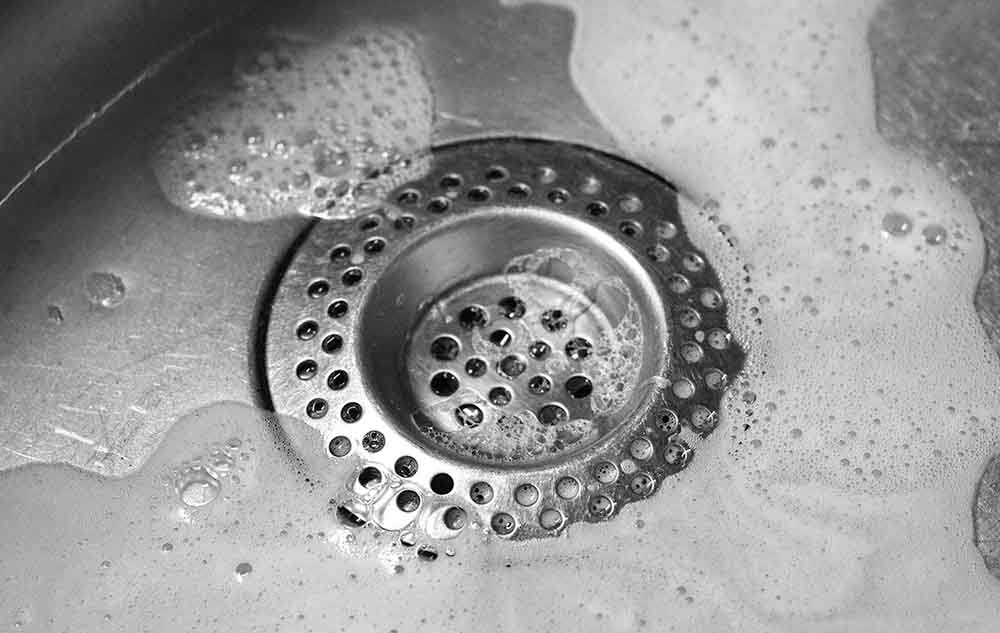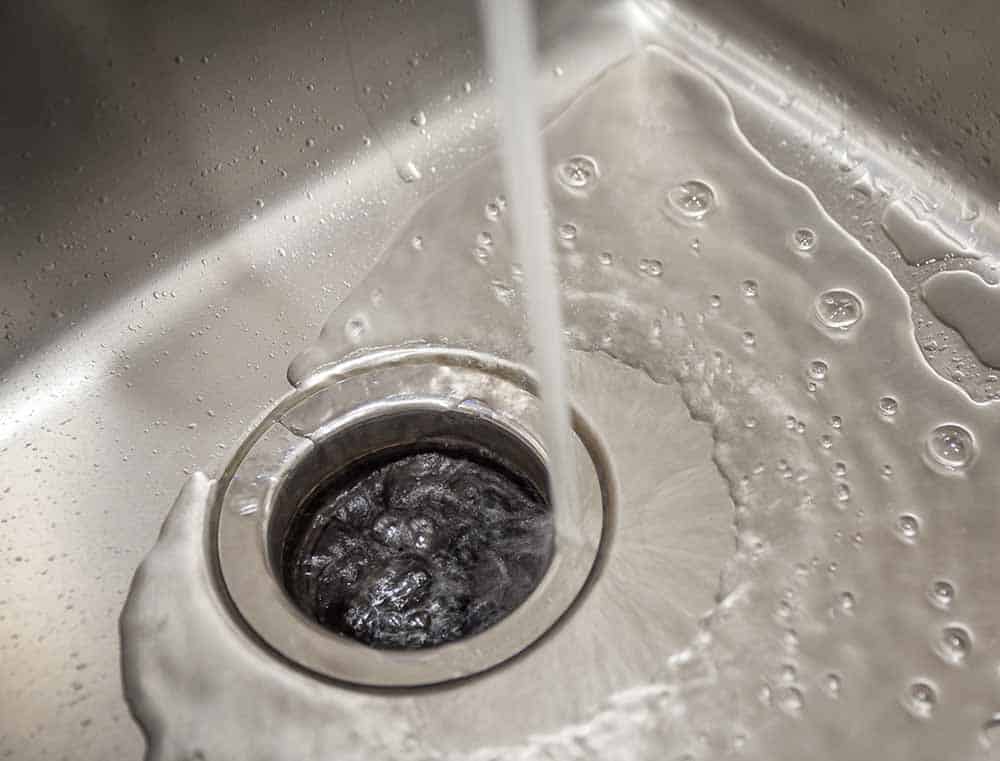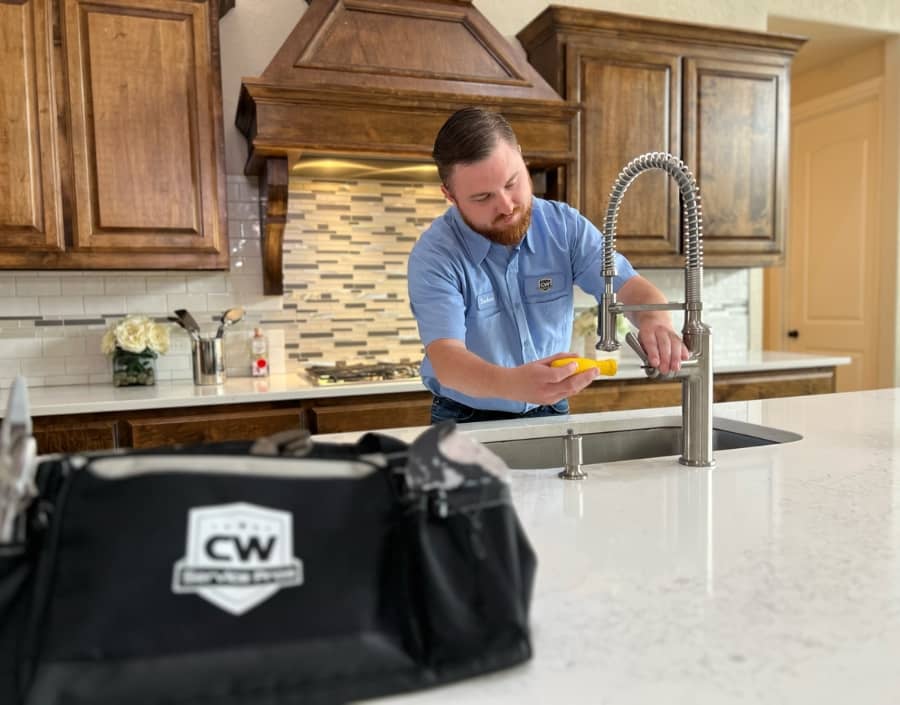Are you struggling with scale build up on your faucets? Wondering how to fix hard water issues? Hard water is a real problem for homes in the Dallas-Fort Worth area — but CW Service Pros can help!
What is Hard Water?
Water from rivers, lakes, reservoirs, and other natural sources picks up small amounts of minerals, especially calcium and magnesium.
Water that contains dissolved calcium and magnesium is referred to as hard water — and the more dissolved minerals the water contains, the harder it is.
What Problems Are Caused by Hard Water?
Hard water isn’t toxic or dangerous to drink, although it does taste different compared to soft water.
While hard water isn’t dangerous, it does cause problems in the home. There are three main issues with hard water.
Detergents and Soaps Don’t Lather

Soaps and detergents lather easily in soft water, but hard water is different. The calcium and magnesium in hard water chemically react with soap, forming insoluble salts that don’t lather. No matter how vigorously you scrub, you can’t get the same rich, foamy lather you can achieve with soft water. Because of this, some people feel they don’t get fully clean when taking a bath or shower unless the water is soft.
Even though it is more difficult rinse shampoo from your hair if you have soft water, people who suffer symptoms such as itchy skin, dry skin and hair, or brittle and damaged hair often benefit from the slick feel that soft water leaves after you bathe.
Laundry and kitchen detergents often have the same problem. They don’t lather easily in hard water, so dishes and clothes may not be perceived as getting clean in hard water. However, it’s more difficult for clothing, towels, and other items to rinse thoroughly in the wash cycle with soft water.
Soaps Form a Scummy Residue
A related issue is soap scum, a mixture of dirt, soap, and minerals from the water.
If you have hard water, you may notice soap scum as a chalky, off-white, or gray residue left behind on surfaces after a bath or shower. It doesn’t easily wipe off and becomes difficult to remove from surfaces that aren’t cleaned regularly.
Scale Builds Up on Fixtures and Appliances
Hard water can cause long-term problems, too. As water passes through pipes, fixtures, and appliances in the home, it deposits trace amounts of calcium and magnesium on those surfaces. These deposits are called scale or limescale.
Any fixtures and appliances that use water — including faucets, showerheads, and pipes, as well as sinks, bathtubs, and toilets — can accumulate scale deposits. Appliances such as coffee makers, dishwashers, and clothes washers can have scale build-up. Hot water tanks and tankless water heaters are also affected.
Small amounts of scale are relatively harmless, but scale deposits get larger and thicker over time. Heavy limescale deposits can block pipes and reduce the function and efficiency of any fixtures and appliances that use water. For instance:
- Faucets and showerheads may have reduced water flow.
- Coffee made in your coffee maker may start to taste unpleasant.
- Hot water systems lose efficiency and use more energy than normal to keep water hot.
- Dishwashers and clothes washers are less effective at cleaning.
How to Tell if You Have Hard Water

The signs of hard water are easy to spot.
You definitely have hard water if you:
- Have trouble lathering soaps and detergents.
- See soap scum in the bathtub or shower.
- See white buildup where the water comes out of faucets and showerheads.
Find limescale on plumbing fixtures and appliances. The signs may be more subtle if your water is only a little hard. Some indications of hard water may be masked by your soaps and detergents.
Testing Your Water for Hardness
A water test kit can tell you whether your home water supply is hard and even gives you the concentration of dissolved minerals in it.
Water hardness test kits from the hardware store are designed for home use. They’re easy, safe to use, and work in just a few minutes.
How to Fix Hard Water Problems
When it comes to fixing hard water problems, you have two options: address the causes of hard water, or its effects.
Addressing the Effects of Hard Water
You can do a few things to reduce the negative effects of hard water in the home:
Soaps and Detergents: Switch to products formulated for use with hard water. Some shower gels lather even in hard water. Certain shampoos, conditioners, and laundry and kitchen detergents have been formulated for use with hard water.
Another option is to install shower head water softeners. These are special shower heads that filter out minerals as water passes through. They contain filter cartridges that need to be replaced around every three months.
Soap Scum and Scale: Acids effectively remove soap scum and scale build-up. Weak acids such as lemon juice and vinegar are suitable for home use. Some commercial products use stronger acids to remove heavy scale deposits. But it’s not a good idea to use these commercial products frequently, as they can cause damage to fixtures and appliances.
These methods can help you address the problems that hard water causes but they don’t prevent new scale deposits from forming.
If your home has hard water, treating scale is a never-ending battle — and a potentially expensive one. Long-term scale deposits can cause pipe blockages and damage plumbing fixtures, appliances, and hot water systems.
Hard Water Treatment Systems

When it comes to hard water problems, prevention is definitely a more effective solution. Installing a hard water treatment system lets you sidestep all of the issues associated with hard water. These systems have an up-front cost but can save money in the long run.
To fix hard water problems permanently, you can install a water softener system or a descaler. Each type of system has some benefits and drawbacks.
Water Descalers treat hard water so the minerals in the water stay attracted to a crystal formation, making them harmless to the plumbing. Instead of leaving deposits on fixtures and surfaces, the crystals flow through the system freely. The main drawback with water descaler systems is that they’re not as effective at treating very hard water, but they’re suitable for water with a low to moderate hardness level.
Water Softeners treat hard water by removing the minerals that are present. These systems are typically more effective than water descalers in areas that have high levels of water hardness or TDs (total dissolved solvents).
- Ion-exchange softeners pull calcium and magnesium out of the water and replace it with sodium. The sodium used for this system is contained in a resin tank attached to the water supply. This process does add salt to your water supply, but it’s a very low level that doesn’t affect the taste of your water. To keep ion-exchange systems working, they need to be recharged with fresh salt every so often.
- Dual tank systems are ion-exchange systems that operate two resin tanks. This ensures that when one tank is low on sodium and needs to be recharged, the second tank kicks in as a backup.
- Reverse osmosis softeners force water through a semi-permeable membrane at high pressure. This process removes metals and nitrates as well as minerals. These systems are typically installed as under-bench solutions for a single water access point rather than whole-house treatment solutions.
Talk to CW Service Pros Today to Discuss Options for How to Fix Hard Water Issues in Your Home
Tired of soap scum, scale deposits, and other hard water issues? Call CW Service Pros today and find out how we can you fix hot water issues in your home! We can talk you through your options, help you find a solution that works for you, and perform a quick, clean installation to get your home up and running more efficiently and cost-effectively.
















